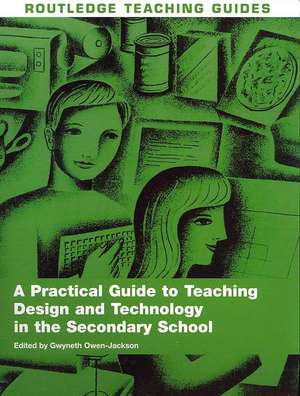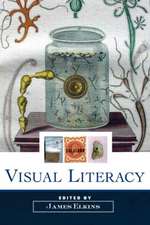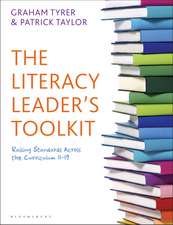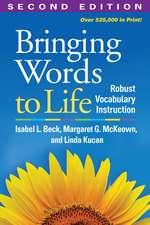A Practical Guide to Teaching Design and Technology in the Secondary School: Routledge Teaching Guides
Editat de Gwyneth Owen-Jacksonen Limba Engleză Paperback – 11 mai 2007
Designed to be used by student teachers, NQTs and beginning teachers, this workbook covers each main specialist area of Design Technology: electronics and communications technology (ECT), food technology, materials technology and textiles technology. Topics covered include:
- design and technology in the school curriculum
- the importance of health and safety
- the use of ICT in the teaching of design and technology
- planning lessons
- managing the classroom
- assessment issues
- the integration of literacy, numeracy, citizenship and sustainability into design and technology
- your own professional development.
| Toate formatele și edițiile | Preț | Express |
|---|---|---|
| Paperback (1) | 301.93 lei 6-8 săpt. | |
| Taylor & Francis – 11 mai 2007 | 301.93 lei 6-8 săpt. | |
| Hardback (1) | 764.20 lei 6-8 săpt. | |
| Taylor & Francis – 27 iul 2016 | 764.20 lei 6-8 săpt. |
Preț: 301.93 lei
Nou
Puncte Express: 453
Preț estimativ în valută:
57.77€ • 60.32$ • 47.82£
57.77€ • 60.32$ • 47.82£
Carte tipărită la comandă
Livrare economică 04-18 aprilie
Preluare comenzi: 021 569.72.76
Specificații
ISBN-13: 9780415423694
ISBN-10: 0415423694
Pagini: 144
Ilustrații: 5 black & white tables
Dimensiuni: 210 x 297 x 8 mm
Greutate: 0.27 kg
Ediția:New.
Editura: Taylor & Francis
Colecția Routledge
Seria Routledge Teaching Guides
Locul publicării:Oxford, United Kingdom
ISBN-10: 0415423694
Pagini: 144
Ilustrații: 5 black & white tables
Dimensiuni: 210 x 297 x 8 mm
Greutate: 0.27 kg
Ediția:New.
Editura: Taylor & Francis
Colecția Routledge
Seria Routledge Teaching Guides
Locul publicării:Oxford, United Kingdom
Cuprins
Part 1: Design and Technology in the Classroom 1. Design and Technology in School 2. Electronics and Communications Technology (ECT) in the Classroom 3. Food Technology in the Classroom 4. Materials Technology in the Classroom 5. Textiles Technology in the Classroom 6. Design and Technology and Vocational Education Part 2: Teaching Design and Technology 7. Teaching and Learning in Design and Technology 8. Using ICT in Design and Technology 9. Cross-Curricular Teaching and Learning 10. Creating an Effective Learning Environment 11. Assessing Pupils' Learning 12. Planning Your Teaching Part 3: Continuing Your Professional Development 13. Your professional Development
Recenzii
Review 1
Andy Mitchell, Assistant Chief Executive the Design and Technology Association
I am very familiar with the work of Gwyneth Owen-Jackson as an author in the field of design and technology education both in my capacity as an executive of the Design and Technology Association and also having worked for 10 years in HE initial teacher education.
Review 2
Marion Rutland
.
Is there a real need for this book and what are the principal markets? Please indicate the level at which the book would appeal and identify the main buyers (quantify if possible):
The main market is likely to be in England as this book focuses on design and technology in the English school curriculum. However, and it likely that other countries for example Wales, Scotland and Northern Ireland who have a similar educational philosophy for design and technology will be interested. Overseas this would include countries such as Australia, New Zealand, Cyprus and the Caribbean. This is not likely to be the US as their ‘technology’ curriculum varies considerably from the UK.
If the book is intended for the student market, how would you expect it to be used (e.g. indicate whether main text, recommended reading, library only). Please list courses:
This book is intended to be linked with a previously published book by the same author, ‘Learning to teach design and technology in the secondary school’, a book that is used as a main text on many PGCE Secondary Design and Technology courses in the England. This practical work book will address a gap by providing a range of practical activities to support and complement the more theoretical nature of the other books. Its main use would be for initial teacher trainees on university and school based courses. However, it would be of use to school based mentors to support their work with trainee teachers in their schools. It would also be of interest as a core book for libraries. The book would be of interest to teacher following MA education based courses in design and technology.
What would you consider to be a reasonable price for the book?
Cost is a key issue as the main target market is students on initial teacher courses. If the cost is considerably over £15 I would see this as restricting the number of books bought by trainee teachers as many have given up well paid post to become teachers and are frequently of a mature nature with family commitments.
What are the principal competitive books available and what particular advantages has the proposed new book?
There is not, to my knowledge, a similar book on the market at this point in time. It is the practical nature of the book that makes it unique.
How quickly is this book likely to become out of date?
The school curriculum is under constant change but the design and technology curriculum is now much more established than in the early days of the National Curriculum. There is now clear evidence of good practice that can be shared within the teaching community.
Is the author a recognised authority in this field?
Yes, she has published books and with the field of design and technology and is a recognised authority. She is currently Chair of the Design and Technology Associations’ ITE Advisory Group.
Is the author’s coverage of the subject adequate and appropriate to the level aimed at. If not , what modifications are needed?
Yes, the focus on pedagogy and suggestions of case studies and overview of available teaching resources section is appropriate at this point in time. The suggested outline covers the key areas of subject application and teaching and learning issues in design and technology.
Do you recommend that we should publish this book?
Yes, I consider that it would be well received by the design and technology community.
Please add any additional comments you feel might be helpful to us in our consideration of this proposal.
I am confident that the author will apply herself with diligence and hard work to completing the authoring of this publication within the agreed constraints.
Andy Mitchell, Assistant Chief Executive the Design and Technology Association
I am very familiar with the work of Gwyneth Owen-Jackson as an author in the field of design and technology education both in my capacity as an executive of the Design and Technology Association and also having worked for 10 years in HE initial teacher education.
- Is there a real need for this book and what are the principal markets? Please indicate the level at which the book would appeal and identify the main buyers (quantify if possible):
Yes there is a need for this book. Unlike other curriculum areas, there is surprisingly little published to specifically address the needs of those training to teach D&T. The issues it intends to cover often have to be addressed in distinctly different ways compared to other subjects as D&T has particular needs associated with for example styles of teaching and learning, nature of activity, use of resources and attention to health and safety. The text Learning to teach design and technology in the secondary school goes some way toward addressing this and has been a very popular publication with tutors and students alike. However taking this further by concentrating upon the provision of a range of practical activities and strategies to support beginning teachers is attractive. The principle market for this book will be students on 1 to 4 year course of initial teacher training for D&T teaching.
Market in the UK: - mainly
Market in the US: - small
Market elsewhere: -other countries particularly Australia, New Zealand Botswana have closely followed the UK D&T model and would find this text useful. - If the book is intended for the student market, how would you expect it to be used (e.g. indicate whether main text, recommended reading, library only). Please list courses:
I would anticipate that this book could become a standard course reader or at least recommended reading on most D&T ITT reading lists along with Learning to teach design and technology in the secondary school. I would expect however that both the leading provider e.g. HEI and their supporting institutions i.e. partnership schools would wish to feature this book in resource lists created to support QTS students.
D&T QTS courses I am familiar with that might wish to use this include:
1 Year PGCE
I Year Flexible route PGCE (OU)
2 Year PGCE
2 Year BSc/ BA
3 year BSc/BA/Bed
4 Year Bed
Graduate Teacher Programmes
A significant proportion of ITT now takes place in individual schools and under School Centred Initial Teacher Training (SCITT) schemes. These tend to be less securely established than courses in HEIs and do not have access to the resources developed over time in the traditional institutions. I would anticipate that these institutions would also welcome this publication as it would appear to contribute useful and appropriate materials around which to build discreet aspects of a course. Similarly mentors in schools who have the specific remit to train and support students in school would find it a useful book to refer students to when helping them develop the necessary skills. - What would you consider to be a reasonable price for the book?
£16 - £18
- What are the principal competitive books available and what particular advantages has the proposed new book?
There is nothing specifically aimed at the needs of D&T trainees that meets this agenda. There are other generic publications but D&T teachers tend to be fairly reserved about their use of a broader range of texts and are much more likely to identify with those aimed at their subject area. They also identify well with practically based workbooks which provide tried and tested techniques to be applied in lessons.
- How quickly is this book likely to become out of date?
Between 5 and 10 years. The nature of the D&T curriculum will continue to change and the onset of vocational education is likely to have major effects. Having said this, large aspects of this book will remain appropriate and will be relatively unchanged by developments expected over the next few years for instance planning, assessing and creating effective learning environments.
- Is the author a recognised authority in this field?
She is well respected in the D&T community and her previous publications have made a significant contribution to the literature that is commonly used to support the training and development of both students in ITT and also beginning teachers in the early stages of their careers. She is also highly respected in the subject community as being an international expert in the field of teacher education and has made major contributions to developing this field. Currently she is chair person of the D&T Association ITT Advisory Group and works closely with this association who are regularly approached to provide advice to DfES, QCA and the TDA.
- Is the author’s coverage of the subject adequate and appropriate to the level aimed at. If not , what modifications are needed?
I am happy with the coverage addressed as set out in the Outline. The proposal makes reference to the Secondary National Strategy materials and although reference to this initiative should not exist as a distinct section, I would hope that the main focus of this work i.e. pedagogical approach to designing will be addressed thoroughly in the book. Certainly it would be worth while considering a separate section that addressed the teaching of design skills as it is likely for some time to continue to be an area in which tutors and students need support. (It could be that this is considered as a strand that goes across the other chapters but this is not made clear).
- Do you recommend that we should publish this book?
Yes I strongly recommend you publish this book as it represents a significant addition to the relatively small collection of materials written to support D&T ITT.
- Please add any additional comments you feel might be helpful to us in our consideration of this proposal.
Review 2
Marion Rutland
.
Is there a real need for this book and what are the principal markets? Please indicate the level at which the book would appeal and identify the main buyers (quantify if possible):
The main market is likely to be in England as this book focuses on design and technology in the English school curriculum. However, and it likely that other countries for example Wales, Scotland and Northern Ireland who have a similar educational philosophy for design and technology will be interested. Overseas this would include countries such as Australia, New Zealand, Cyprus and the Caribbean. This is not likely to be the US as their ‘technology’ curriculum varies considerably from the UK.
If the book is intended for the student market, how would you expect it to be used (e.g. indicate whether main text, recommended reading, library only). Please list courses:
This book is intended to be linked with a previously published book by the same author, ‘Learning to teach design and technology in the secondary school’, a book that is used as a main text on many PGCE Secondary Design and Technology courses in the England. This practical work book will address a gap by providing a range of practical activities to support and complement the more theoretical nature of the other books. Its main use would be for initial teacher trainees on university and school based courses. However, it would be of use to school based mentors to support their work with trainee teachers in their schools. It would also be of interest as a core book for libraries. The book would be of interest to teacher following MA education based courses in design and technology.
What would you consider to be a reasonable price for the book?
Cost is a key issue as the main target market is students on initial teacher courses. If the cost is considerably over £15 I would see this as restricting the number of books bought by trainee teachers as many have given up well paid post to become teachers and are frequently of a mature nature with family commitments.
What are the principal competitive books available and what particular advantages has the proposed new book?
There is not, to my knowledge, a similar book on the market at this point in time. It is the practical nature of the book that makes it unique.
How quickly is this book likely to become out of date?
The school curriculum is under constant change but the design and technology curriculum is now much more established than in the early days of the National Curriculum. There is now clear evidence of good practice that can be shared within the teaching community.
Is the author a recognised authority in this field?
Yes, she has published books and with the field of design and technology and is a recognised authority. She is currently Chair of the Design and Technology Associations’ ITE Advisory Group.
Is the author’s coverage of the subject adequate and appropriate to the level aimed at. If not , what modifications are needed?
Yes, the focus on pedagogy and suggestions of case studies and overview of available teaching resources section is appropriate at this point in time. The suggested outline covers the key areas of subject application and teaching and learning issues in design and technology.
Do you recommend that we should publish this book?
Yes, I consider that it would be well received by the design and technology community.
Please add any additional comments you feel might be helpful to us in our consideration of this proposal.
I am confident that the author will apply herself with diligence and hard work to completing the authoring of this publication within the agreed constraints.
Descriere
This practical and accessible workbook is designed to support student-teachers, NQTs and beginning teachers as they develop their teaching skills, and increase their broader knowledge and understanding for teaching design and technology.



















